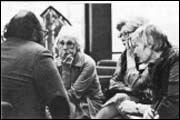Thirty years of feminist transformation
The 1977 Women and Religion resolution transformed the Unitarian Universalist Association.
When she returned to her congregation, the First Parish in Lexington, Massachusetts, Longview wrote and circulated a resolution asking “all Unitarian Universalists to examine carefully their own religious beliefs” and reconsider teachings that “perpetuate attitudes that cause women everywhere to be overlooked and undervalued.” The “Women and Religion Resolution” passed unanimously at the Association’s 1977 General Assembly.
Feminist groups were already active in many UU congregations and districts. The Women and Religion movement quickly caught on, beginning in Massachusetts, California, and Maryland. In 1978 UUA President Paul Carnes appointed the Rev. Leslie Westbrook as Minister to Women and Religion, set up a committee to implement the resolution, and asked districts to fund their own Women and Religion committees. (The UUA funded the initiative through 1996.)
With staff, funding, and ink backing them up, women across the Association began strategizing how to eradicate sexism from their own religion.
The first task was to change sexist language. Women and Religion groups charged that the UUA’s Principles, written in 1961, failed to affirm women (with phrases like “the dignity of man”) and failed to show respect for the earth. A revision process led to the 1985 Principles and Purposes, which substantially rewrote the previous six Principles and added a seventh: “Respect for the interdependent web of all existence of which we are a part.”
Activists also objected to language in Hymns for the Celebration of Life, the UUA’s 1964 hymnal, which had sections titled “Man,” “Love and Human Brotherhood,” and “The Arts of Man.” Interim hymnbooks circulated until a commission could complete Singing the Living Tradition in 1993, which uses more inclusive language.
One of the most visible changes spawned by the Women and Religion movement has been the rapid increase in women UU ministers—from about 5 percent in 1977 to about 50 percent today. That trend is expected to escalate, as 70 percent of UU retired ministers are men and 75 percent of those preparing for fellowship are women.
Along with more women in the pulpit, feminist theology has reshaped the tone of both UU worship and religious education. Many of the new worship forms designed by Women and Religion groups—such as the water ceremony, chalice lighting, and sharing of joys and sorrows—have been so wholly embraced by churches that UUs are often surprised to discover their relatively recent, and feminist, origins.
Women demanded and got curricula celebrating goddesses, women religious leaders, and women’s spirituality: Cakes for the Queen of Heaven by the Rev. Shirley Ranck in 1986—a revision is being released this summer—and Rise Up and Call Her Name by Elizabeth Fisher in 1994.
Yet even with so many successes in changing their religion, some of the resolution’s advocates now question whether their vision has come to pass. The idea of the resolution, says Rosemary Matson, a longtime Women and Religion activist, was not only to add women ministers, nonsexist language, or feminist curricula and worship forms. It was to scrutinize and root out patriarchal forms and stories and transform our spirituality entirely. “We do not want a piece of the pie,” Matson has said many times over the years. “It is still a patriarchal pie. We want to change the recipe.”
See sidebar for links to related resources.








